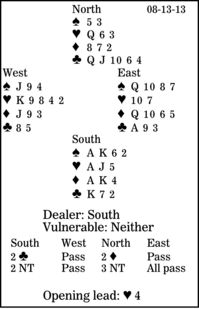Bridge column, August 13: Play too quickly and go down slowly

For a bridge declarer, it can be a case of no entry card, no contract success -- as in this deal.
How should South plan the play in three no-trump after West leads the heart four and East puts up his 10?
With all of those aces and kings, that South hand is worth a two-club opening bid even if your range for a two-no-trump opening is a good 20 to 22.
South starts with six top tricks: two spades, two hearts (given the lead) and two diamonds. He can establish at least three club tricks, but if the defender with the ace can hold up that card until the third round of the suit, declarer will need a dummy entry. This can be only the heart queen.
First, this requires West's having the heart king. That is highly likely because without the king, West would have probably led the nine from a holding like 9-8-7-4-2. Second, South must win the first trick with his ace, not with his jack. Then, after driving out the club ace and winning East's shift, declarer can lead a heart toward dummy's queen to generate that vital entry.
The opening observation was made by Joe Henderson about the Boston marathon. To stop nonentries suddenly seeming to be doing well, each runner has a microchip in his laces. This also gives everyone an accurate start-line-to-finish-line time.
** ** **
COPYRIGHT: 2013, UNITED FEATURE SYNDICATE
DISTRIBUTED BY UNIVERSAL UCLICK FOR UFS

